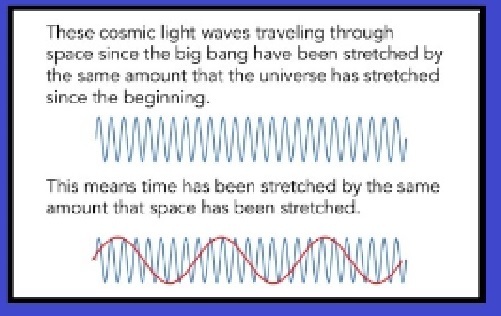Schroeder’s theory is quite interesting. However, upon reflection, it does not seem to hold water.
Schroeder points out that the perceived flow of time changes as the rate of expansion of the fabric of space-time (i.e., the universe) increases. This is true; however, it means this depiction of time flows is exactly backwards.
In other words, from the perspective of the cosmic observer of Genesis, time would become slower compared to the earth’s frame of reference as we move forward through history. This is because cosmic expansion is accelerating, not slowing. (Excluding for the cosmic inflation period, which lasted for a tiny fraction of the very first second after the Big Bang.)
However, Schroeder’s graph depicts the cosmic observer’s day periods becoming shorter, not longer, as history proceeds. His goal is to make it appear that the period of a day declines logarithmically until we reach the current frame of reference, which supposedly starts with the creation of Adam. But as I mentioned in the previous paragraph, those days should be getting longer and longer, culminating in an enormous discontinuity at the Adam boundary.
Not being a Ph.D. in physics, I might be wrong. But it looks to me like Schroeder got things mixed up.
I will close with an extensive quote from Mark Perakh, who served as professor of statistical mechanics at Cal State-Fullerton.The whole article is an interesting read.
Schroeder considers the example of a light signal which carries information about the explosion of a supernova that occurred 170 thousand years ago (measured in the earth’s time). Since the supernova (1978A) is located 170 thousand light years from the earth, the light signal took exactly that long to reach the earth. Since, though, the light signal moves with the speed of light, the flow of time in the frame of reference attached to the signal “stopped.” If there existed an observer “living” in the frame of reference of the signal, (which is impossible as no physical body can move with the speed of light) for “him” the explosion of the supernova and the arrival of the signal on Earth would have happened simultaneously.
Schroeder’s explanation entails a serious flaw. A frame of reference which can be attached to photons simply does not exist. If it existed, the photons would be at rest in such a system. However, photons cannot be at rest. According to the special theory of relativity, photons always move with the same speed (in vacuum) in every frame of reference. If a frame of reference wherein photons are at rest existed, time would stop in such a frame. Since, though, no such frames of reference are possible, Schroeder’s concept is meaningless.
Of course, in accordance with his agenda, Schroeder tries to prove the analogy between the described alleged “paradox” of the theory of relativity and the concept of God being “outside time.” The concept of God being “outside time” belongs to the realm of faith and has nothing in common with the non-existing effect of “time stopping” in systems moving with the speed of light. Schroeder’s attempt, inadvertently invoking the image of God running with speed of light past stars and planets in order to satisfy the conditions of the theory of relativity, can only discredit Schroeder’s approach, and, with it, the concepts of faith themselves.
A better way to harmonize Scripture and science is to understand the message of Scripture (is it really a science textbook?) and the limits of science (does it have any ability to describe God’s perspective?).
My $.02,
Chris
P.S. @hipfan - perhaps you have some thoughts on this?
